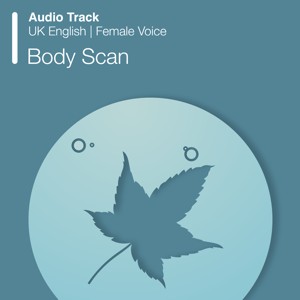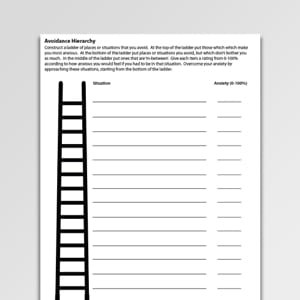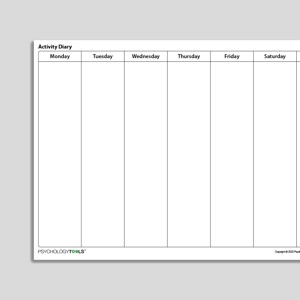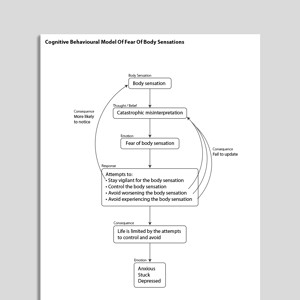Pain (Acute Pain And Chronic Pain)
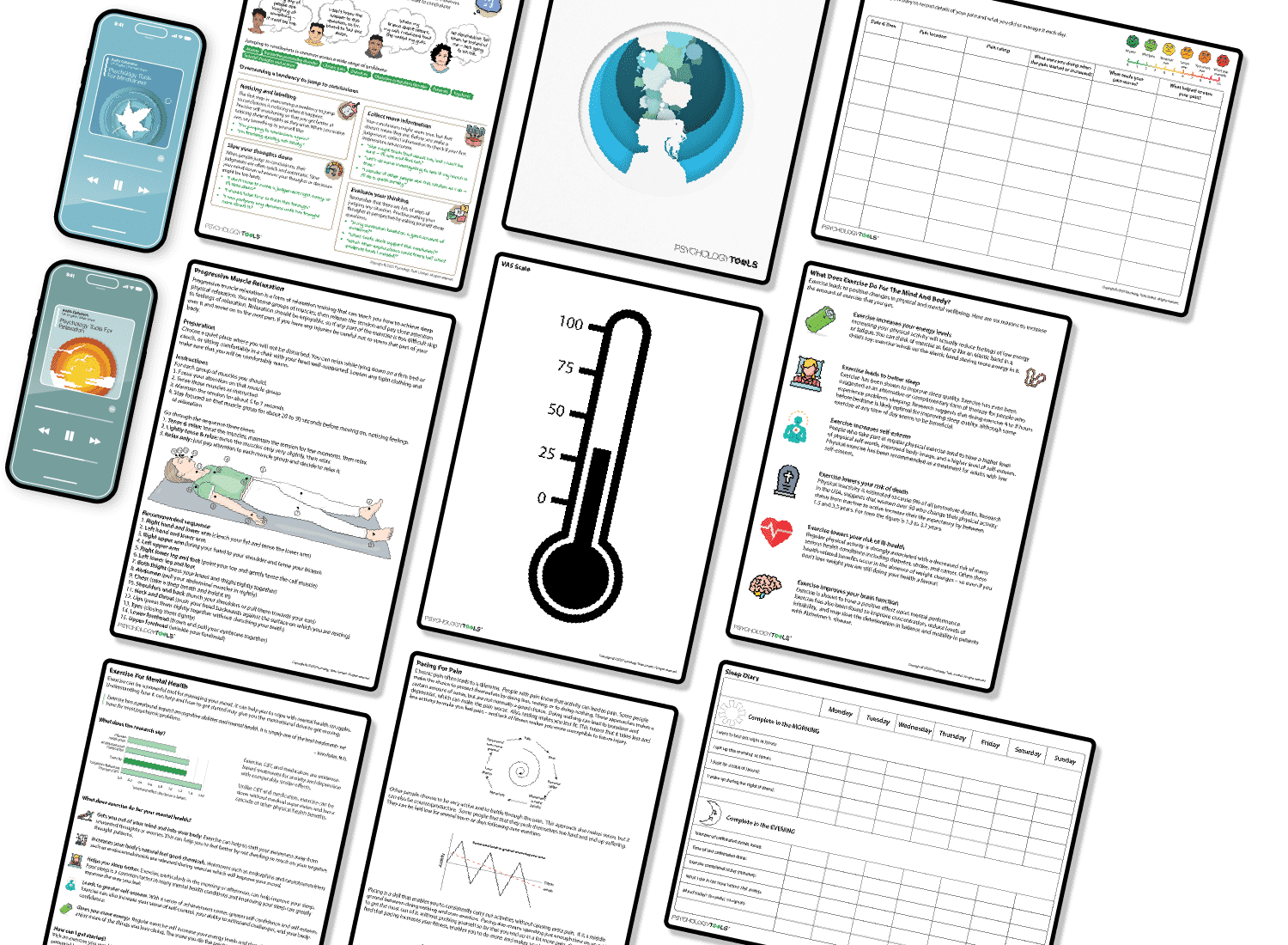
Unhelpful Thinking Styles (Archived)
Emotions Motivate Actions
Audio Collection: Psychology Tools For Relaxation
Activity Menu
Behavioral Experiment
Progressive Muscle Relaxation
Behavioral Experiment (Portrait Format)
Audio Collection: Psychology Tools For Mindfulness
Self-Sacrifice
Values: Connecting To What Matters
Fear Ladder
Evaluating Unhelpful Automatic Thoughts
Valued Domains
Activity Diary (Hourly Time Intervals)
Choosing Your Values
Activity Planning
Emotional Deprivation
Exploring Valued Domains
Vulnerability To Harm
Progressive Muscle Relaxation (Audio)
Sleep Diary
[Free Guide] An Introduction To Values
Mistrust/Abuse
Pacing For Pain And Fatigue
Developing Psychological Flexibility
Dependence / Incompetence
Body Scan (Audio)
Avoidance Hierarchy (Archived)
Health Anxiety Thought Record
Pessimism
Externalizing
Punitiveness
Relaxed Breathing Exercise 1 (Audio)
Progressive Muscle Relaxation (Archived)
Mindfulness Of Breath (Short Version) (Audio)
Activity Diary (No Time Intervals)
Jumping To Conclusions
Being With Difficulty (Audio)
Cognitive Behavioral Model Of Fear Of Body Sensations
Combined Relaxation Exercise (Audio)
Exercise For Mental Health
Identifying The Meaning Of Body Sensations
Mindfulness In Everyday Life (Audio)
Relaxed Breathing Exercise 3 (Audio)
Mindfulness Of Breath (Long Version) (Audio)
Relaxed Breathing Exercise 2 (Audio)
Pain Diary
Mindfulness Of Sounds And Thoughts (Audio)
Mindful Attention (Audio)
What Does Exercise Do For the Mind And Body?
Relaxed Breathing Exercise 4 (Audio)
VAS Scale
Thinking Versus Sensing (Audio)
Pain Activity Diary
Raisin Exercise (Audio)
Links to external resources
Psychology Tools makes every effort to check external links and review their content. However, we are not responsible for the quality or content of external links and cannot guarantee that these links will work all of the time.
Assessment
-
Chronic Pain Acceptance Questionnaire – Revised (CPAQ-R)
| McCracken, Vowles, Eccleston | 2004
- Scale
- Reference McCraken, L. M., Vowles, K. E. & Eccleston, C. (2004). Acceptance of chronic pain: component analysis and a revised assessment method. Pain, 107, 159-166.
-
Illness Perception Questionnaire – Revised (IPQ-R)
| Weinman, Petrie, Moss-Morris, Horne | 2002
- Scale
- Reference Moss-Morris, R., Weinman, J., Petrie, K., Horne, R., Cameron, L., & Buick, D. (2002). The revised illness perception questionnaire (IPQ-R). Psychology and health, 17(1), 1-16.
Information Handouts
- The Pain Toolkit – a helpful toolkit for people who live with persistent pain | Pete Moore, Dr Frances Cole | 2009
- Back pain management program: Pacing activities | Cambridge University Hospitals NHS
- Improve your functioning through effective pacing | Dr Williams, Dr Carey | 2003
Information (Professional)
- Acceptance and commitment therapy in the treatment of chronic pain | Dahl, Lundgren
Presentations
- Pain management: application of cognitive behavioral methods | Michael Nicholas
- Lecture on fear avoidance in chronic pain | Johan Vlayen | 2008
- A multidisciplinary facial pain service | Sarah Baker
- Acceptance and Commitment Therapy (ACT) and Chronic Pain | Lance McCracken | 2015
Self-Help Programmes
-
When Panic Attacks (Workbook)
| Centre For Clinical Interventions | 2023
- Module 1: Overview Of Panic
- Module 2: What Keeps Panic Disorder Going
- Module 3: Overcoming Thoughts About Panic
- Module 4: Coping With Physical Alarms
- Module 5: Facing Feared Situations
- Module 6: Dropping Safety Behaviors
- Module 7: Maintaining Your Gains
Treatment Guide
- Guidelines for pain management programmes for adults | British Pain Society | 2013
- Life with chronic pain: an acceptance-based approach (Therapist guide and patient workbook) | Kevin Vowles, Sohn Sorrell | 2007
- Cognitive behavioral therapy for chronic pain – therapist manual | Murphy, McKellar, Raffa, Clark, Kerns, Karlin
- ACT for chronic pain | Lance McCracken | 2015
Recommended Reading
- McCracken, L. M., & Vowles, K. E. (2014). Acceptance and commitment therapy and mindfulness for chronic pain: model, process, and progress. American Psychologist, 69(2), 178
What Is Pain?
Signs and Symptoms of Acute and Chronic Pain
Pain is a multisensory experience with sensory and affective components. Sensory components of pain describe where the pain is, what it feels like, and how strong it is. Affective components of pain describe how the pain makes us feel. Therapists working with pain patients also find it helpful to assess and work with the behavioral, cognitive, functional, and social effects of pain.
Psychological Models and Theory of Acute and Chronic Pain
Fear-Avoidance Model of Chronic Pain
The fear-avoidance model of chronic pain (Vlaeyen & Linton, 2000) describes a trajectory followed by individuals experiencing acute pain who may become trapped in a vicious cycle of chronic disability and suffering. As a cognitive model it proposes that the appraisals pain patients form concerning their pain can lead to sequences that end in avoidance, deconditioning, and further pain and suffering. The fear-avoidance model of chronic pain is empirically well-supported but it has been argued that the next generation of the model needs to add motivational components including goals and self-regulatory processes (Crombez et al, 2012).
Acceptance and Commitment Therapy (ACT) Model of Chronic Pain
ACT is a transdiagnostic approach to human difficulties that is popular among clinicians working with pain.
“The basic premise of ACT as applied to chronic pain is that while pain hurts, it is the struggle with pain that causes suffering … continuing attempts to control pain may be maladaptive, especially if they cause unwanted side effects or prevent involvement in valued activities, such as work, family, or community involvement” (Dahl & Lundgren, 2015).
References
- Crombez, G., Eccleston, C., Van Damme, S., Vlaeyen, J. W., & Karoly, P. (2012). Fear-avoidance model of chronic pain: The next generation. The Clinical Journal of Pain, 28(6), 475–483.
- Dahl, J., & Lundgren, T. (2015). Acceptance and commitment therapy in the treatment of chronic pain. Retrieved from: https://www.div12.org/wp-content/uploads/2015/06/ACT-in-the-treatment-of-chronic-pain.pdf
- Vlaeyen, J. W. S., & Linton, S. J. (2000). Fear-avoidance and its consequences in chronic musculoskeletal pain: A state of the art. Pain, 85(3), 317–332.




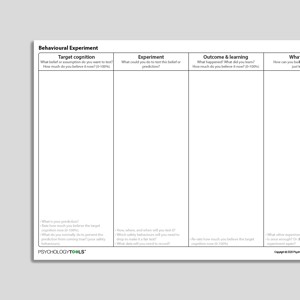


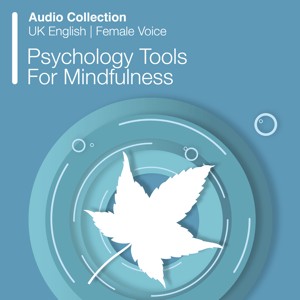



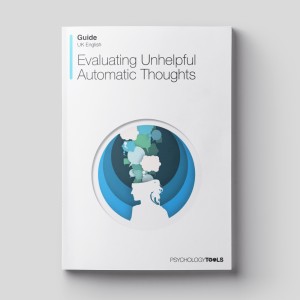



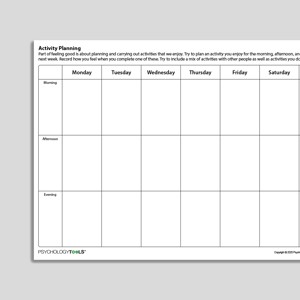





![[Free Guide] An Introduction To Values](https://media-engine-production-public.s3.eu-west-2.amazonaws.com/28518/conversions/%2A-an_introduction_to_values_en-gb_Guides_Cover-preview.jpg)




